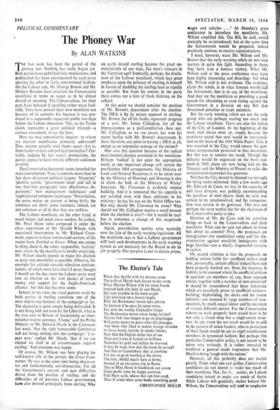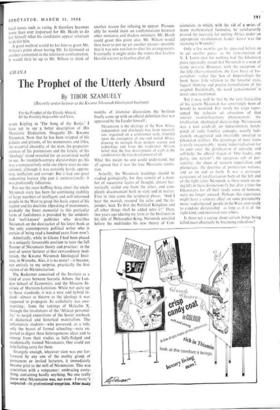POLITICAL COMMENTARY _
The Phoney War
By ALAN WATKINS
rritt€last week has been the period of the
phoney war. Nothing has really begun yet. Both parties have published their manifestoes; and publication has been accompanied by each party abusing the other in fairly conventional fashion. On the Labour side, Mr. George Brown and Mr. Herbert Bowden have attacked the Conservative manifesto in terms so vague as to be almost devoid of meaning. The Conservatives, for their part, have behaved if anything rather more fool- ishly. They have praised their own manifesto not because of its contents but because it was pro- duced to a supposedly expectant public two days before the Labour document. This, so the Tories claim, represents a great political triumph—a curious assessment, to say the least.
Here we may conveniently inquire : to whom are election manifestoes primarily addressed? Does anyone actually read them—apart, that is, from leader writers and political journalists? Cer- tainly, judging by last week's productions, the parties appear to have entirely different audiences in mind.
The Conservative document seems intended for mass consumption. True, it contains more than its fair share of current political jargon : `blueprint,' `positive action,' government team' and (all in one four-line paragraph) `cost effectiveness de- partment,' new management techniques' and `sophisticated computer techniques.' Nevertheless, the prose makes an attempt at being brisk; the sentences are short; some sentences, indeed, are not sentences at all in that they are verbless.
The Labour manifesto, on the other hand, is much longer and much more sombre: Its author, Mr. Peter Shore (who composed it under the close supervision of Mr. Harold Wilson, with occasional intervention by Mr. Richard Cross- man), appears to have summarised sections of his recent book Entitled to Know. When one comes to thing about it, the sober, responsible, `realistic' note struck by the manifesto is hardly surprising. Mr. Wilson clearly intends to make this election as quiet and uneventful as possible. (Observe, for example, his attitude towards television confron- tations, of which more hereafter.) I never thought I should see the day when the Labour party went into an election on the twin planks of sound money and support for the Anglo-American alliance : but that day has now come.
Indeed, in my view, the ritual gestures made by both parties to sterling constitute one of the most depressing features of the campaign so far. The electorate is quite simply being defrauded. It is not being told, not even by the Liberals, what is the true cost to Britain of maintaining an inter- national reserve currency. 'I hope,' said the Prime Minister to Mr. Edward Heath in the Commons last week, 'that the right honourable Gentleman will not bring sterling into this campaign.' I re- peat now,' replied Mr. Heath, 'that if we are elected we shall in all circumstaxes support sterling.' And everyone was happy.
Of course, Mr. Wilson was here playing his well-known role of the patriot, the Great Com- moner. He was at the same time being obscuran- tist and fundamentally anti-democratic. For all the Government's current and past difficulties derive from the position of sterling; and the difficulties of all previous Labour governments have also derived principally from sterling: Why on earth should sterling become the great un- mentionable of our time, like men's trousers in the Victorian age? Ironically, perhaps, the drafts- man of the Labour manifesto, which lays great emphasis upon the primacy of sterling, is himself in favour of shedding the sterling load as rapidly as possible. But from his seniors in the party there comes not a hint of fresh thinking on the subject.
At this point we should consider the position of Mr. Brown's department after the election. The DEA is by its nature opposed to sterling. Mr. Brown, for all his faults, represents progress of a sort; Mr. James Callaghan, for all his impressiveness as a parliamentarian, does not. Mr. Callaghan, as we are aware, has won his recent battles with Mr. Brown's department Is there therefore any point in having a DEA at all, except as an unpopular scourge of the unions?
One asks this question because of the radical departmental changes promised in the manifesto. Perhaps 'radical' is not quite the appropriate word, as one important change will restore the pre-October 1964 arrangements. The Ministry of Land and Natural Resources is to be taken over by the Ministry of Housing; and Housing is also to claim the bulk of the Ministry of Works' functions. Mr. Crossman is evidently empire building. And it is rumoured that his appetite is not satisfied even with these additions to his ministry: he has his eye on the Welsh Office too. But why should Mr. Crossman be alone? Why should not Mr. Callaghan receive a small present when the election is over?—for it would be tact- less to announce a change of this magnitude before the election.
Again, post-election queries arise naturally over the fate of the early warning legislation. All the manifesto says is that a Labour government will 'seek such developments in the early warning system as are necessary for the Board to do its job properly. Our purpose is not to dictate prices, wages and salaries. . . ! At Monday's press conference to introduce the manifesto, Mr. Wilson amplified this. The Bill, he said, would certainly be re-introduced; but at the same time the Government would be prepared, indeed positively anxious, to receive representations.
I must, however, warn Mr. Wilson and Mr. Brown that the early warning rebels do not view matters in quite this light. According to them, they have won a famous victory. What Mr. Wilson said at the press conference may have been highly interesting and diverting: but what Mr. Wilson said is not evidence. The evidence, claim the rebels, is in what lawyers would call the instrument; that is to say, in the manifesto. And they see the manifesto as providing a good reason for abstaining or even voting against the Government in a division on any Bill that threatened penalties to trade unionists.
But the early warning rebels are not the only group who are perhaps reading too much into the Labour manifesto. There are also the toilers of the City of London. At the beginning of the week steel shares went up, simply because the manifesto stated that steel would be renational- ised on the basis of the 1965 White Paper. This, it was assumed in the City, would ensure the gen- erous compensation promised in that document But this was to assume too much. Though the industry would be organised on the basis out- lined in 1965, plans are now being laid (in the Treasury and the Ministry of Power) to lace the compensation somewhat less generous.
Not that the City should be blamed too strongly for being under-informed. Only a few weeks ago Mr. Edward du Cann, no less, in his capacity of unit trust director, was publicly recommending the purchase of steel shares. 'Steel, he said, was certain to be renationalised, and the compensa- tion was certain to be generous. This was not perhaps the most tactful line for the chairman of the Conservative party to take.
Mention of Mr. du Cann and his activities brings us back to the Conservatives and their manifesto. What can be said not about its form but about its content? First, the proposals on immigration—for conditional entry and for dis- crimination against would-be immigrants with large families—are a wholly disgraceful exercise in racism.
My second criticism is that the proposals on holding unions liable for unofficial strikes (and also, presumably, certain official strikes) have not been properly worked out. How, for instance, is liability to be assessed where the unofficial strikers in question are members of, say, three separate unions, together with a number of non-unionists? It should be remembered that those industries which are peculiarly prone to unofficial strikes— building, shipbuilding, the docks and the motor industry—are manned by large numbers of non- unionists, by much casual labour and by members of several different unions. For the Conservative scheme to work properly there would have to be not only a closed shop but a single-union struc- ture. In any event the net result would be to add to the powers of union leaders, who in protection of their funds would be apt to expel troublesome members in tyrannical fashion. But perhaps this particular Conservative policy is not meant to be taken very seriously. It is rather intended to reinforce a general crude impression that Mr. Heath is being 'tough with the unions.'
However, all this probably does not matter greatly. From what one can gather, Conservative candidates do not intend to make too much of their manifesto. Nor, for th... matter, do Labour candidates intend to make too mach of theirs. While Labour will gratefully shelter behind Mr. Wilson, the C,onservatives will tend to emphasise
local issues such as rating. It therefore becomes more than ever important for Mr. Heath to do for himself what his candidates appear reluctant to do for him.
A good method would be for him to grant Mr. Wilson's point about having Mr. Jo Grimond as another contestant in the television confrontation. It would then be up to Mr. Wilson to think of another reason for refusing to appear. Presum- ably he would insist on confrontations between other ministers and shadow ministers. Mr. Heath could grant this point also. Mr. Wilson would then have to put up yet another excuse—possibly that it was now too late to alter his arrangements. Eventually it might strike the voters that fearless Harold was not so fearless after all.







































 Previous page
Previous page